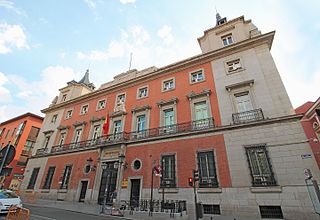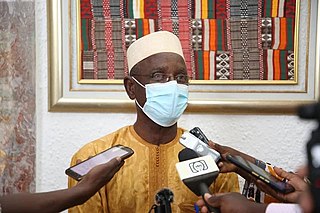The Department of Internal Affairs (DIA) is the public service department of New Zealand charged with issuing passports; administering applications for citizenship and lottery grants; enforcing censorship and gambling laws; registering births, deaths, marriages and civil unions; supplying support services to ministers; and advising the government on a range of relevant policies and issues.

María Teresa Fernández de la Vega Sanz is a Spanish politician and magistrate of the Socialist Party. During her political career, she served as first deputy prime minister, minister of the Presidency and government spokesperson under prime minister José Luis Rodríguez Zapatero from 2004 to 2010 and as president of the Council of State from 2018 to 2022, being the first first female deputy prime minister and the first female president of the advisory council.

The Council of Ministers is the main collective decision-making body of the Government of Spain, and it is exclusively composed of the Prime Minister, the deputy prime ministers and the ministers. Junior or deputy ministers such as the Secretaries of State are not members of the Council. The Monarch may also chair the Council when needed on the invitation of the Prime Minister.
The Spanish order of precedence is currently prescribed by Royal Decree 2099/1983. The decree establishes the order of precedence of national official activities as well as common regulations to activities organised by municipalities, autonomous communities and other public institutions. The general order established by the decree is modified if the event takes place in the capital, Madrid, instead of elsewhere in Spain.

The Cabinet of Dominica is appointed by the President of Dominica acting in accordance with the advice of the Prime Minister of Dominica.

The Ministry of Transport and Sustainable Mobility (MITMA), traditionally known as the Ministry of Development (MIFOM), is the department of the Government of Spain responsible for preparing and implementing the government policy on land, air and maritime transport infrastructure and the control, planning and regulation of the transport services on this areas. It is also responsible for guaranteeing access to housing; urban, soil and architecture policies; planning and controlling the postal and telegraph services, directing the services related to astronomy, geodesy, geophysics and mapping, and planning and programing the government investments on infrastructure and services related to this scope. The Ministry's headquarters are in the New Ministries government complex.
An information minister is a position in the governments of some countries responsible for dealing with information matters; it is often linked with censorship and propaganda. Sometimes the position is given to a separate Minister of Culture.

The spokesperson of the Government is the minister in charge of the public relations of the Government of France.

Lalith Chandrakumar Weeratunga, SLAS, is the former Permanent Secretary to the President of Sri Lanka. As the President's Secretary he was the top civil servant in the country and de facto head of the Sri Lanka Administrative Service. Prior to the appointment he was the Secretary to the Prime Minister of Sri Lanka.

The Ministry of Justice (MJUS) was the department of the Government of Spain responsible for preparing and carrying out the government policy in order to bring the legal system off, specially in criminal, civil, commercial and procedural law affairs, supporting the Administration of Justice and the legal and international cooperation.

The Ministry of Defence (MINISDEF) is the department of the Government of Spain responsible for planning, developing and carrying out the general guidelines of the Government about the defence policy and the managing of the military administration. It is the administrative and executive body of the Spanish Armed Forces.

Rafael Rodríguez-Ponga y Salamanca is a Spanish linguist and high-ranking civil servant, with a wide administrative, academic and political activity. He is rector of Abat Oliba CEU University of Barcelona. He has been Secretary-General of Instituto Cervantes.

The Ministry of the Presidency (MPR) was the department of the Government of Spain that, from 1974 to 2023, assured the link between the different Ministries and the Prime Minister and it was responsible for the relations between the Government and the Parliament. This department also supported The Crown in the exercise of its functions.

María Isabel Celaá Diéguez is a Spanish politician. In June 2018, she was appointed Minister of Education and Vocational Training and Spokesperson of the Government of Spain. Since 2022, she serves as Ambassador to the Holy See.

The Ministry of Education, Vocational Training and Sports (MEFPD) is the department of the Government of Spain responsible for proposing and carrying out the government policy on education and vocational training, including all the teachings of the education system except university education, without prejudice to the competences of the National Sports Council in matters of sports education. Likewise, it is also the responsibility of this Department the promotion of cooperation actions and, in coordination with the Ministry of Foreign Affairs, the promotion of international relations in the field of non-university education.
The Secretary of State for Press, also known as Secretary of State for Communication (SECOM) is a high-ranking official of the Office of the Spanish Prime Minister in charge of the government's communication policy. This position must not to be confused with the Spokesperson of the Government, which is normally one of the government ministers.

The Cabinet of the Prime Minister's Office, officially Cabinet of the Presidency of the Government, is a political and technical assistance body at the service of the Prime Minister of Spain. The Cabinet of the Prime Minister is composed of multiple departments directly responsible to the Premier and coordinated by the Chief of Staff. The Cabinet Office, the officials that work on it, their offices and the departments make up the Office of the Prime Minister.
The Ministry of Information and Tourism was a ministerial department of the Government of Spain created in 1951 during the dictatorship of Francisco Franco to control information and the censorship of press and radio. The ministry also assumed the management of Tourism, an important industry at that time when it had an important flowering. In historiography, some authors consider it as a simple Ministry of Propaganda.

The Ministry of Education, Culture, Research, and Technology is a government ministry of the Indonesian government responsible for education, cultural, research, and technology affairs. Its formation resulted from the merger of the Ministry of Education and Culture and the Ministry of Research and Technology in April 2021.

Ouhoumoudou Mahamadou's Government governed Niger from 9 April 2021 until its overthrow by the military following the 2023 Nigerien coup d'état on 26 July and its replacement by the National Council for the Safeguard of the Homeland.










































